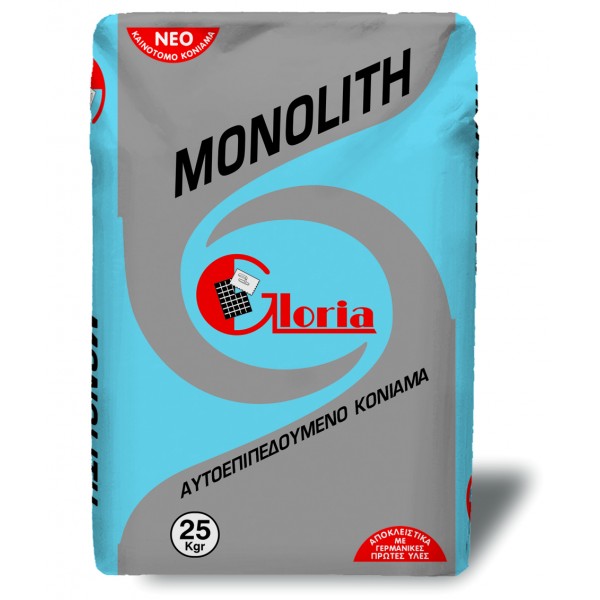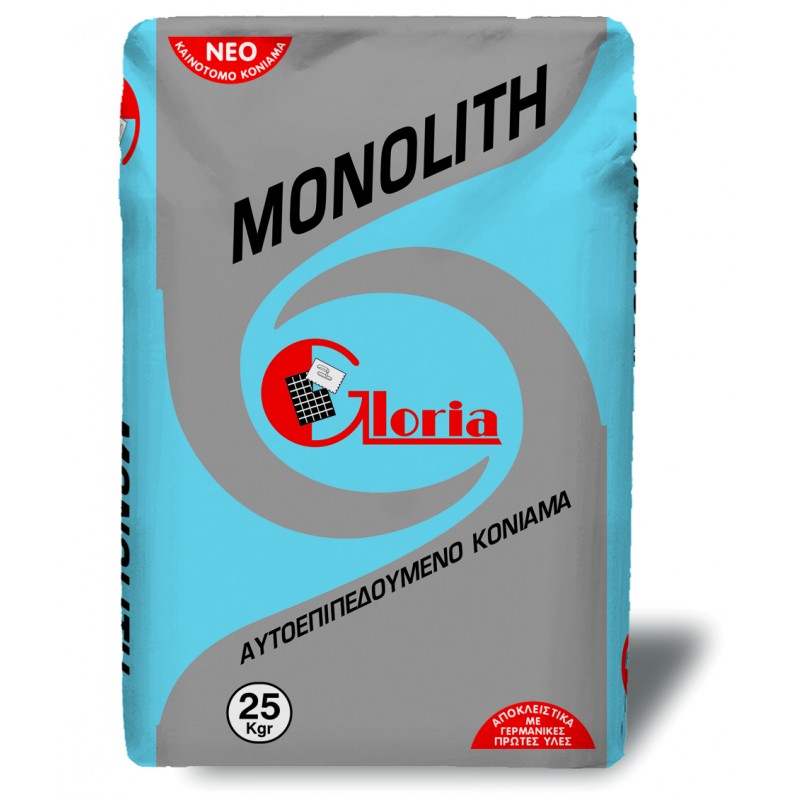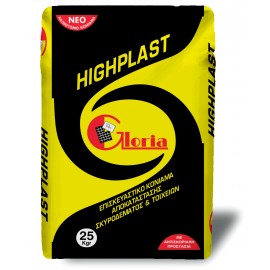GLORIA MONOLITH Self-leveling mortar
- Brand: Gloria
- Product Code: 07.001
- Availability: In Stock
Description
SELF LEVELING MORTAR
GLORIA MONOLITH 3-10
TECHNICAL DATA SHEET 3rd Edition March 2016
GENERAL FOR THE PRODUCT:
Mortar based on Portland cement, high strength, a component used for flattening and leveling of concrete surfaces, settlement sites or smoothing and leveling of damaged concrete floors. When cured and hardened the MONOLITH is coated with ceramic tiles, Porcelain tiles, cotto, natural stone, marble, linoleum, hardwood flooring, PVC or other materials for floors such as forged cement. The product fills a maximum hundredth floor thickness. Its formula guarantees the quality required for such applications in floors in the building.
● used indoors as well as for warehouse floors, garages, patios, parking spaces etc.
● coating thickness of 3 to 10 mm.
● Miscible with water only without addition of the reinforcing emulsion.
● Produced with HDE technology and acquires excellent liquidity.
● The ratio (yield) per liter of fresh pulp sack is high.
● develops directly a smooth finish and completely flat surface with excellent mechanical properties that guarantee the successful coating of all kinds of commercial materials.
● It has dimensional stability (no shrinking minutes) and long-term performance.
● No cracking circumferentially nor capillary formating on its surface.
● It has excellent adhesion to concrete and cement.
● Achieved excellent performance-price ratio.
● Complies with the guidelines and requirements of the European standard EN 13813.
MANUAL:
Preparing background:
thoroughly clean the surface from dust, dirt and debris. Residues of grease or oil must be removed thoroughly with appropriate cleaning liquid commercial products. Loose, brittle or prone to delamination sections launched down and removed. Low mechanical strength parts must be checked. Damaged parts with holes, dents, detachments or other defect can be repaired with special fast-setting mortar GLORIA HIGHPLAST.
Smooth floors with very low absorption or completely non-absorbent, such as ceramic tiles, epoxy paints, surfaces with residues of vinyl adhesives (for PVC), or smooth cement coatings, compact and well anchored, must be prepared with a mechanical grinder or by spreading quartz adhesion primer available in the market, single-component, water-based adhesion promoters, always following the instructions.
Application:
If the old flooring is porous or the ambient temperature is high, wett the surface with water or lubricate with aqueous base primer for reducing and regulating the absorption and also to avoid bubbles forming in the leveling product. Carefully observe the times indicated in the instructions before applying GLORIA MONOLITH.
Mix MONOLITH with appropriate amount of water in mortar mixing machine and stir the mixture 2-3 minutes to form a homogenous paste without lumps.
Allow the mixture to stand for 2 to 5 minutes to "digest", and after the shaking sometimes even poured and spread on the floor with a smooth large spatula or swab. Use spiked roller then to remove any bubbles and create a smooth surface.
Do not add more water than recommended as it will not improve the workability and may cause shrinkage during drying thereby reducing the surface hardness, compressive strength and adhesion to the background.
You work above 10C that the material dries in a reasonable time. Upon curing the grout, we try to keep the surface liquid for 24 hours in particular when the temperature is high. Above 30-32 C avoid applying MONOLITH as it is difficult for any leveling material spread right at the specified rate.
Mixing ratio:
The 25 kg of dry product just need 5,32litra purified water to the mixture to function as self-leveling. Adding 3-4% less water, MONOLITH can be used as cast mortar. This can be applied in surface with small inclination.
OBSERVATIONS:
The coating of the self-leveling usually after 1-2 days. The mechanical strength of the mortar grow quickly within the first days of its implementation, but the receipt and mechanical stress damping needs more days maturity to fully develop.
Do not apply MONOLITH when the temperature is more than 320C, or blowing air strongly as these conditions affect the open time and curing takes place and rapid water evaporation.
Do not mix the product with cement, lime, plaster or stucco as its composition and performance (degraded) altered altered.
Do not use GLORIA MONOLITH floor to form a thickness exceeding 10 mm.
Before coating of parquet or plastic materials (eg PVC), check residual humidity with a hygrometer.
Do not overlay with the product expansion joints.
If there is doubt about the suitability of the product in a particular background, consult the technical department of the company.
SPECIFICATIONS:
● Physical state: Solid mixture.
● Appearance: gray (gray), mesokkoki cement.
● Category inclusion (compliance): CT-C30-F6 (according to standard EN 13813). Premixed dry product.
● Mineralogical composition aggregates: Crystalline calcium carbonate, quartz, alumina, goulastonitis.
● Spectrum grain aggregates: Up to 600mm.
● the storage time: 12 months in sealed containers, stored in low humidity areas.
● water mixing coefficient (water factor): 21,3% by weight.
● Maximum layer thickness: 10mm.
● Release time (pedestrian): 6 hours.
● Idle Time to coating: 24 hours.
● Pot life: ≥ 25 minutes.
● Operating time as a self-leveling (CSTB 2893-370): ≥ 20 minutes.
● Consumption: 1.5-1.6 kg / sq. meter / millimeter thickness. Consequently, for thick floor 5 mm for example, they take 7.5 to 8 kg of dry product. So a sack of 25 kg covers approximately 3.5 square meters.
● Adhesion to concrete after 28 days (EN 13892-8): ≥ 1,5 N / mm2.
● Compressive strength after 7 hours (ELOT EN 13892-2): ≥ 8 N / mm2.
● Compressive strength after 7 days (ELOT EN 13892-2): ≥ 20 N / mm2.
● Compressive strength after 28 days (ELOT EN 13892-2): ≥ 30 N / mm2.
● Flexural strength after 28 days (ELOT EN 13892-2): ≥ 6 N / mm2.
● Friction loss after 24 hours (ELOT EN 12808-2): ≤ 180mm3.
● Surface hardness after 28 days (ELOT EN 13892-6): ≥ 50 N / mm2.
PACKAGE:
In resistant paper sacks of 25 kg.



